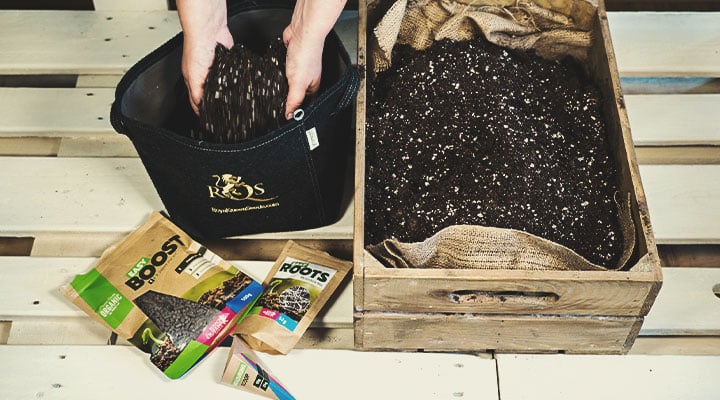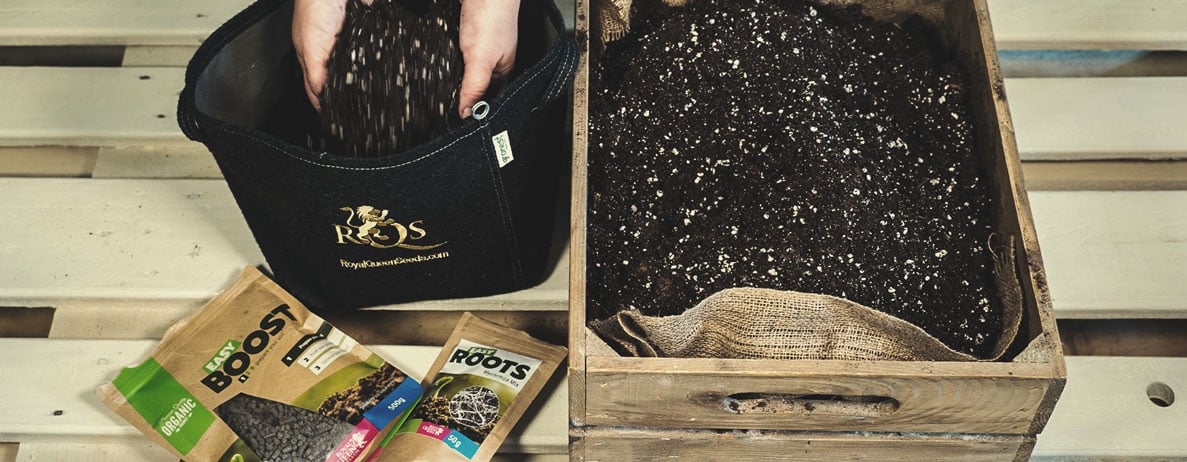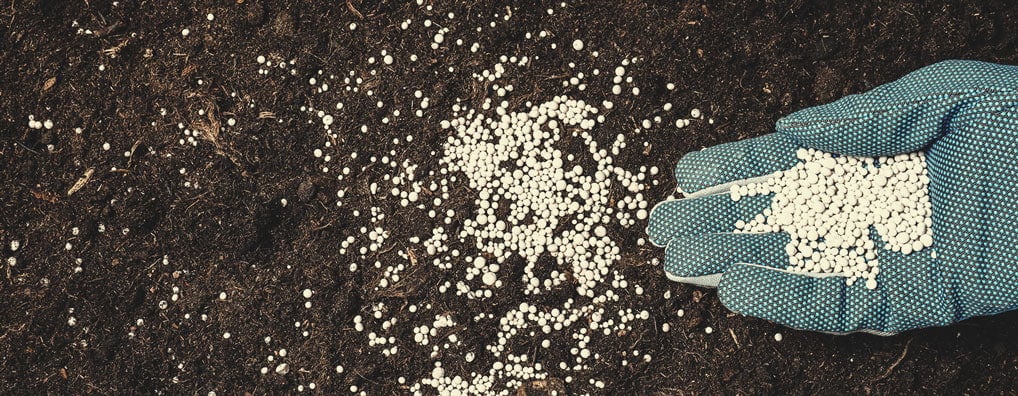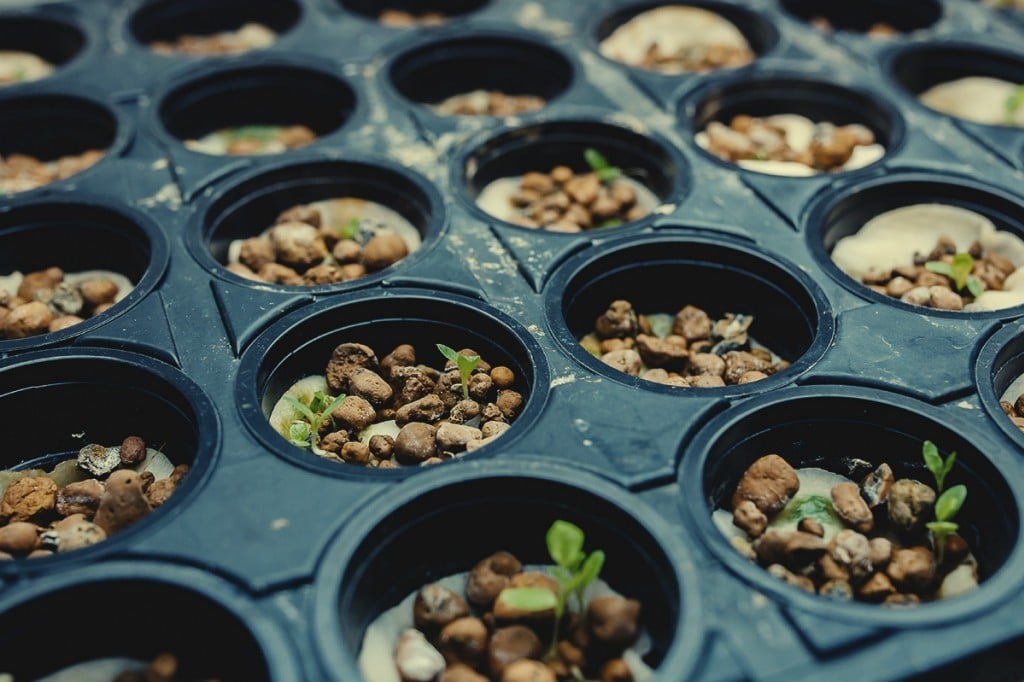.

Organic vs Synthetic Fertiliser for Cannabis
Which side are you on when it comes to organic vs synthetic fertilisers? Organic nutrients help to feed the myriad organisms that build healthy soil, and they're also better for the environment. However, synthetic fertilisers can bring deficient plants back from the brink. Explore both sides of the argument here.
Contents:
Every living organism, including your cannabis plants, requires nutrients. But you're not confined to a single source when taking care of your crop. The debate around organic vs synthetic fertiliser rages on within the weed community. Below, you'll discover the pros and cons of each type, to help you choose the best option for your unique growing situation.
Growing Naturally: Is Organic Weed Better?
Growing organic cannabis involves no synthetic chemical inputs. Instead, growers use manure, compost, plant teas, and foliar sprays to nourish their specimens. This method produces less of an impact on the environment and helps to preserve soil life. Organic nutrients have been shown to increase the abundance of soil organisms such as fungal mycorrhizae[1]. Other studies have shown that these associations are effective in promoting mechanisms favorable to terpenoid accumulation in plants[2], which has also been observed in Cannabis sativa[3].

| Advantages | |||||||
|---|---|---|---|---|---|---|---|
| Packed With Key Nutrients | Enhances Microbial Life | ||||||
| Improves Soil Structure | Less Nutrient Runoff | ||||||
| Less Nutrient Waste | Enhances Flavor and Aroma of Buds | ||||||
| Less Chance of Burning Due to Overfeeding | Sustainable and Renewable | ||||||
| Disadvantages | |||||||
| Slow Release | Can Attract More Pests | ||||||
| Cost | Sometimes Harder to Apply | ||||||
| The Nutrient Contents Can Fluctuate | Slower Breakdown in Colder Climates | ||||||
What Are the Benefits of Organic Nutrients for Growing Cannabis?
Organic vs synthetic: which reigns supreme? Whether you're growing in containers or no-till beds, organic nutrients can do wonders for your plants. Many cultivators are also attracted to organic nutes because they’re easy to make at home. As they’re packed with organic matter, they not only help to keep your cannabis plants well-fed, but they serve as a vital food source for beneficial microbes in the soil. But what does this mean for budding cannabis growers? Well, a healthy soil food web allows plant health and productivity to surge.
Let's dig a little deeper on the benefits of organic fertiliser.

| Advantages |
| Packed With Key Nutrients |
| Enhances Microbial Life |
| Improves Soil Structure |
| Less Nutrient Runoff |
| Less Nutrient Waste |
| Enhances Flavor and Aroma of Buds |
| Less Chance of Burning Due to Overfeeding |
| Sustainable and Renewable |
-
Packed With Key Nutrients
Organic fertiliser is rich in macronutrients and micronutrients that plants depend on to survive. Manure contains good quantities of nitrogen to fuel leafy growth, potassium to ferry water and minerals throughout plants, and phosphorus to drive flowering. Good-quality composts are also loaded with vital micronutrients such as magnesium, calcium, manganese, sulphur, and iron.
Organic options also contain more diverse nutrients than synthetic forms. Giving cannabis plants access to the host of minerals and elements they need to survive won’t only increase growth and yields, but will help them fight off diseases and pests more effectively.
-
Enhances Microbial Life
Organic nutrients such as worm castings, compost, chicken manure, horse manure, seaweed, bone meal, and woodchips drastically enhance beneficial microbial life. These materials decompose over time thanks to specialized bacteria and fungi. In turn, this process starts the cycling of carbon and nitrogen, and creates active organic matter and humus that feeds a wealth of organisms including bacteria, fungi, nematodes, arthropods, and other species. Healthy populations of these life forms help cannabis plants thrive, and some of them even form synergistic relationships with the herb.
-
Improves Soil Structure
An abundance of soil microorganisms creates a better soil structure. Lifeless soil takes on a dusty appearance and easily erodes during heavy rainfall. In contrast, soil packed with life becomes spongy, firm, and more immune to erosion. Bacteria create biofilms that glue soil particles together, and fungal threads weave through the topsoil to create aggregates.
Well-structured soil also allows water to flow through in a gradual fashion. As the water flows, it creates a vacuum that pulls in oxygen and creates an aerobic environment. Interestingly, many disease-causing microbes cannot thrive in these conditions.
-
Less Nutrient Runoff
As microbes create better soil aggregation, the growing medium develops a better capacity to hold water. Whenever you apply a seaweed root drench or nettle tea, the spongy soil will hold on to the nutrients and ensure your plants are able to utilise them. Additionally, organic matter sources such as manure retain nutrients such as nitrogen, and release them slowly over time. This helps to keep nutrients in the soil during heavy rainfall and other weather events that cause erosion and runoff.
-
Less Nutrient Waste
The slow-release properties of organic nutrients mean much less goes to waste. Microbes work hard to chomp, shred, and digest this material into beautiful soil filled with nutrients that are accessible to plants. However, important elements such as nitrogen are either bound up in organic matter or passed through the bodies of worms and bacteria. Because these nutrients are cycled through the soil food web, and not left sitting in bare soil, they are protected from eroding rains, meaning much less goes to waste. As such, organic nutrients feed plants for a much longer period than synthetic, and require fewer applications to get the job done.
-
Enhances Flavor and Aroma of Buds
Every cannabis cultivar has a distinct flavor and smell. Volatile hydrocarbons known as terpenes underpin these characteristics. Cannabis flowers produce terpenes in small translucent glands known as trichomes in an effort to protect themselves from predation and communicate.
In order to grow tasty weed, cultivators employ numerous techniques to boost terpene production. Organic nutrients might help to bolster terpene levels by fostering thriving populations of mycorrhizal fungi (species that fuse to and synergise with plant roots) that are known to enhance terpene accumulation in some plant species.


-
Less Chance of Burning Due to Overfeeding
Cannabis growers that use synthetic nutrients often run into issues with overfeeding. Beginners are especially prone to adding an excess of nitrogen, which can cause toxicity and burning. Because organic nutrients are bound up in the organic matter, they take longer to become plant-available. This slow-release mechanism helps to eliminate the risk of nitrogen burn and other nutrient overloads that can damage foliage, affect growth, and reduce yields.
-
Sustainable and Renewable
Organic nutrients are better for the planet in most circumstances, especially those obtained from your own home. Instead of sending your garden waste and kitchen scraps off to a landfill, you can convert it into nutrient-rich compost. Rather than slicing and throwing away those weeds, why not turn them into nourishing plant teas? Even collecting manure from local farms and woodchips from arborists can put a limit on the amount of waste produced, transmuting these resources into dank nugs.
The Downsides of Organic Nutrients
As you now know, organic nutrients offer a long list of benefits, from nurturing soil life to reducing runoff. However, they do have a few downsides that turn some growers off. Take a look at the disadvantages of organic nutrients below.
| Disadvantages |
| Slow Release |
| Can Attract More Pests |
| Cost |
| Sometimes Harder to Apply |
| The Nutrient Contents Can Fluctuate |
| Slower Breakdown in Colder Climates |
-
Slow Release
While many cultivators prize organic nutrients for their slow-release nature, this can become a problem when you need to add nutrients fast. In cases of nutrient deficiency, for example, you need to add a formulation that can quickly correct the issue. As mentioned, the nutrients tied up in manure and worm castings take a while to become available to plants, so you can’t simply add them as a mulch layer and expect your crop to recover. You can, however, apply preparations such as compost tea and liquid seaweed as foliar sprays for quicker uptake to correct any deficiencies.
-
Can Attract More Pests
Adding mulch layer after mulch layer to your soil protects your growing medium and provides your herd of microorganisms with months worth of food. However, these materials can also become a paradise for pests. Slugs, ants, and even mice are attracted to the shelter that mulch provides. You also run the risk of bringing contaminated batches of compost and manure into your garden that are loaded with pest eggs, herbicides, and weed seeds (the bad kind).
-
Cost
Whether you choose to use bags full of animal poo or tablets and potions made by manufacturers, the cost of organic fertilisers can quickly add up. Products are usually more expensive than synthetic alternatives, and buying bags of mulch materials can easily reach triple figures. This leads many down the path of brewing their own compost tea, and composting everything from kitchen scraps to garden waste to close the loop and save money.
-
Sometimes Harder to Apply
Sure, you can find organic nutrients in the form of pellets that are easy to apply. But sometimes growers are lucky enough to land a massive bag of manure from the farmer down the road. You better roll your sleeves up and grab your rake, because applying it will take some work, especially if you’re growing over a large area.
-
The Nutrient Contents Can Fluctuate
Compost, manure, and other organic fertilisers aren't perfectly dosed like synthetic options. One handful of compost can have a much different NPK profile, for example, than another handful. Although this doesn't cause a problem most of the time—given the slow-release nature of organic nutes—it can stump some growers that are used to more exact ratios.
-
Slower Breakdown in Colder Climates
Organic nutrients aren’t of much use to soil life or your plants if they don’t break down. Growers rely on specific species of fungi and bacteria to kick-start the decomposition process, and they work much more efficiently with a bit of warmth and humidity. If you live in a colder climate, you’ll find it takes quite some time for freshly added amendments to integrate into the soil.
Organic vs Synthetic Fertilisers: A Look at Man-Made Cannabis Nutrients
Synthetic nutrients contain the minerals that are important for plant growth in a form that is instantly available to your plants. The three most essential nutrients for growth and flowering—aka macronutrients—are nitrogen (N), phosphorus (P), and potassium (K). The nitrogen comes from an artificial nitrogen fixation process that’s called the Haber-Bosch process, which was invented in the first half of the 20th century. The phosphorus (phosphate) and the potassium are extracted from minerals, with harmful impurities removed.
Commercial synthetic fertilisers are usually manufactured to contain a specific ratio of these three minerals, designated by the N-P-K ratio, which describes the percentage of each mineral in the product. Along with NPK in specific ratios, other beneficial minerals, like calcium, magnesium, iron, zinc, and others—aka micronutrients—can often be found in synthetic fertiliser products as well.
| Advantages | |||||||
|---|---|---|---|---|---|---|---|
| More Control Over Dosing | Convenient | ||||||
| Quickly Fix Deficiencies | Cheaper | ||||||
| Disadvantages | |||||||
| May Reduce Soil Fertility | Must Apply Regularly | ||||||
| Easier to Overfeed | Nutrient Buildup | ||||||
| Damaging to the Environment | |||||||
Advantages of Synthetic Nutrients
Organic purists are quick to turn their nose up at synthetic nutrients, whereas growers on the other end of the spectrum value them for their consistency. Check out the best reasons to use synthetic nutrients below.
| Advantages |
| More Control Over Dosing |
| Convenient |
| Quickly Fix Deficiencies |
| Cheaper |
-
More Control Over Dosing
Synthetic nutrient formulas offer precise dosing. Whereas organic preparations can fluctuate in NPK values, for example, synthetic nutrients contain no organic matter or fillers, and instead provide a pure source of macronutrients and micronutrients. This makes for precise and consistent dosing, and minimises nutrient deficiencies.
-
Convenient
Synthetic nutrients are super easy to use. They come in various forms, including liquid, pellet, and granule, and are water-soluble. Simply follow the instructions on the given product to dose your plant with growth-stimulating nutrients within a matter of minutes.
-
Quickly Fix Deficiencies
Synthetic nutrients aren’t bound up in manure, compost, or worm castings; they are free-form. This means plants can uptake them as soon as growers administer them to the soil. For this reason, synthetic nutrients are a superior option when it comes to correcting nutrient deficiencies. They enable growers to tackle the issue as soon as symptoms arise, without having to wait weeks for organic nutrients to break down as deficiencies become more severe.
-
Cheaper
Unless you manage to land a heap of organic fertiliser for free, synthetic nutrients are much cheaper outright. You can purchase liquids and pellets at minimal cost, especially if you’re growing on a small scale.
Disadvantages of Synthetic Nutrients
Although synthetic nutrients save growers money and help to rescue plants facing nutrient deficiency, they aren’t perfect—far from it. Here are the downsides worth considering.
| Disadvantages |
| May Reduce Soil Fertility |
| Must Apply Regularly |
| Easier to Overfeed |
| Nutrient Buildup |
| Damaging to the Environment |
-
May Reduce Soil Fertility
Synthetic fertilisers help to nourish plants in the short term, but can reduce the fertility of your soil over time. The salts present in these formulas irritate and kill the beneficial microorganisms that make up the soil food web. Although your plants are receiving the vital nutrients they need, the microbes they depend on will eventually decrease in numbers. As you know, plants don’t depend on nutrients alone to survive. These little critters play an important role in preventing disease and improving soil structure.
-
Must Apply Regularly
Whereas organic fertilisers break down slowly over time, synthetic types are either used up quickly or leach from the soil. This means growers need to apply them more regularly to meet the nutritional demands of their plants. Not only does this increase costs over time, but the soil microbiology takes quite the beating over a single growing season.
-
Easier to Overfeed
You need to exercise care when feeding your cannabis plants with synthetic nutrients. If you don’t read the instructions with a keen eye, you can easily fall victim to overfeeding. In these cases, nutrient burn and toxicity quickly cause leaves to yellow and nutrient uptake to come to a halt, ultimately impacting growth and yield.


-
Nutrient Buildup
Overfeeding can lead to a salt buildup that throws soil pH out of balance. Soil-grown weed plants thrive at a pH of 6.0–7.0. Synthetic fertilisers have the tendency to acidify the topsoil. To prevent this, you’ll need to take frequent readings with a pH tester and use pH-altering products when needed.
-
Damaging to the Environment
Synthetic fertilisers don’t just damage the life in the local soil. Through runoff and erosion, these chemicals make their way into the groundwater and nearby waterways. Here, these pollutants inflict harm on aquatic ecosystems, where they reduce the oxygen content of rivers and streams and often kill fish and other organisms.
Can You Combine Organic and Synthetic Fertilisers?
Absolutely. Both organic and synthetic fertilisers have unique benefits, and you can use one to fill in where the other lacks. Because synthetic fertilisers can damage the soil life when used for a long period, we suggest reaping the myriad benefits of organic nutrients and supplementing with non-organic as needed.
For example, growers that depend on organic nutrients can get into trouble if their plants start to display signs of deficiency. This can arise due to a lack of overall nutrients, or because their mulches are still in the process of breaking down. Cultivators can leverage non-organic fertilisers in this situation to rescue their crops, without depending on them long-term and doing harm to their growing space and the environment beyond. There’s no need to think in absolutes; we often view it as a black and white argument of organic vs synthetic, but it’s not. Simply do what you can organically, but utilise the benefits of synthetic nutrients when you need them.
- Environmental, Energetic, and Economic Comparisons of Organic and Conventional Farming Systems | BioScience | Oxford Academic https://academic.oup.com
- Arbuscular mycorrhizal fungi: effects on plant terpenoid accumulation - PubMed https://pubmed.ncbi.nlm.nih.gov
- Enhancement of growth and Cannabinoids content of hemp ( Cannabis sativa) using arbuscular mycorrhizal fungi - PubMed https://pubmed.ncbi.nlm.nih.gov






































